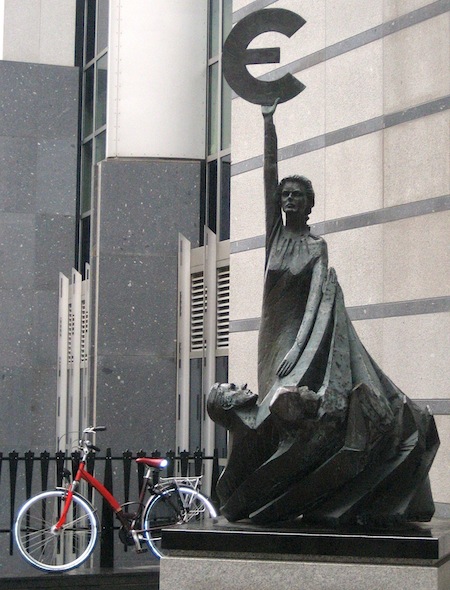
At the heart of the tragic jihadist assault on Brussels this week lies what economics and political scientists know as a collective action problem.![]()
![]()
Within the hollowed-out central state of Belgium, virtually no one wants to foot the bill for the kind of counter-terrorism, security and police investigation operations that Brussels needed to avert Tuesday’s horrific simultaneous airport and subway attacks. The European Commission, which calls Brussels home, has neither the power nor the inclination to provide a supranational layer of security to the city.
Brussels, a majority French-speaking city, is its own region, though it lies completely outside the borders of the left-leaning, French-speaking Wallonia. Meanwhile, the more economically vibrant Flemish-speaking Flanders has, as a condition for keeping the Belgian union together for the past half-century, increasingly demanded more regional powers from both Wallonia and Brussels.
No one — at the European level, at the national level or at either of the Walloon or Flemish regional level — has a proper incentive to fund what’s obviously become a disproportionate security cost for Brussels, in particular (and not, say, Antwerp or Ghent or Charleroi).
* * * * *
RELATED: Is Belgium destined for breakup after
another inconclusive vote?
* * * * *
While there are obviously many reasons for Tuesday’s terror attacks, it’s no surprise that Brussels recurs as the setting for jihadist attacks. Radical Islamists in the Molenbeek community, now an infamous byword for jihadist agitation in Europe, were central to planning the 2004 Madrid attacks, last November’s attacks in Paris and, now, the terrorist strike that Belgian authorities feared four months ago — and that forced Brussels itself into a four-day lockdown as police forces tried to stymie a terrorist plot last November.
Just four months after the Paris attacks, planned from Brussels, brought the Belgian capital to a standstill for 96 hours, and just four days after Belgian police, at long last, captured Salah Abdeslam, the remaining suspect in last year’s Paris attacks, Belgian authorities were already on high alert.
That didn’t matter. Tragedy still struck.
Belgium’s endemic dysfunction

In part, that’s because a country of just over 11 million people is divided into three regions (Flanders, Wallonia and Brussels) and four distinct language areas (Flemish, French, ‘bilingual,’ and the German-speaking areas in the far-east). Brussels, infamously, consists of 19 separate communes, each governed by its own mayor. It took the salacious saga of Marc Dutroux, a rapist-murderer of the 1990s, to streamline policing in Brussels from 19 separate units to just six.
Above all, Brussels has suffered from decentralized funding and governance that began with the development of Belgium’s four language areas in 1963 and the formal establishment of the three regions in 1993. Though Wallonia had traditionally been the wealthier region in Belgium, the decline in the steel and coal industries left it poorer by the middle of the 20th century, and today, GDP per capita is markedly higher in Flanders, while unemployment is markedly higher (and more structural than cyclical) in Wallonia. An ascendant Flanders balked at paying for its now poorer French-speaking neighbors, demanding ever greater autonomy in fiscal matters. That’s divided Flemish-speaking and French-speaking populations increasingly over the years, not unlike Lebanon’s confessional system or the tripartite, ethnic-based and multi-layered government of Bosnia and Herzegovina.
Even if Belgium’s government wanted to force its many layers (national, regional, communal and otherwise) to coordinate over security matters, it couldn’t. Literally, police in one part of the country do not speak the language of police in another part of the country, all in an area roughly the same size as the US state of Maryland.
Politically speaking, that has left Belgium in a Noah’s ark scenario — two by two of every kind: socialists, economic liberals, Christian democrats and so forth. The one difference is that the politics of French-speaking Belgium lacks a strong nationalist option, whereas the nationalist Nieuw-Vlaamse Alliantie (N-VA, New Flemish Alliance), which advocates for ever-greater decentralization, Flemish nationalism and, eventually, a fully independent Flanders, dominates the politics of Flemish-speaking Belgium. Its leader, Bart de Wever, has since January 2013 the mayor of Antwerp, the largest city in Flanders, and the N-VA is today the most dominant force in Flemish and, perhaps, Belgian politics.
All of which makes forming national governments incredibly tricky, and it makes formulating truly national policy even trickier. Famously, after the N-VA won a landslide in Flemish-speaking Belgium in the June 2010 elections, prime minister Yves Leterme stayed on to lead a caretaker government for 541 days while Belgium’s various parties tried to piece together a majority. After the most recent May 2014 elections, prime minister Charles Michel came to power after forming a Flemish-heavy coalition that included, for the first time, the New Flemish Alliance, as well as the Flemish Christian democrats and Flemish liberals. Michel himself comes from the Mouvement Réformateur (Reformist Movement), a Francophone liberal party and the only non-Flemish party currently in government.
Why Europe is unlikely to solve the Brussels puzzle

It’s not been a great 12 months for the long-term project of European integration. Greece’s nearly absurd unforced errors and economic and monetary crisis has undermined the eurozone’s stability. The prospect of Brexit, win or lose, confirmed the reality of a two-speed Europe for all but hardcore federalists. Hungary and, increasingly, Poland, are undermining the EU’s longstanding commitment to liberal democracy and the rule of law. From Austria to Malta, the refugee crisis has undermined the deeply symbolic open borders of the Schengen zone.
Now, Europe faces in Brussels, its de facto capital, a security crisis no less severe than the migrant crisis or the eurozone crisis or any of the other fire drills the continent’s weary leadership faced over the last half-decade. Internal borders will invariably sharpen after the Brussels attacks, putting more strain on a pillar of European integration that’s already cracking under the stress of a wave of migrants.
It’s enough to wonder whether Europe’s latter-day founding fathers, like French president François Mitterrand, German chancellor Helmut Kohl and Commission president Jacques Delors, erred in their determination to fuse a single European currency at Maastricht in 1992. Buoyed by the success of the 1986 Single European Act, which created a common market throughout what was then the European Economic Zone, they took advantage of swelling goodwill in what was then still a mostly western European project to push through what would become today’s eurozone.
Imagine if, instead, those European leaders had prioritized common security over Europe’s external borders and committing German resources to a common European perimeter. Rather, they waited until 1999 to adopt the Schengen agreement as a matter of European treaty law through the Treaty of Amsterdam. It’s hard to imagine, in today’s political climate, that EU leaders could cobble together a common security policy among 28 member states.
It’s equally implausible that security improvements for Brussels could come from EU policymakers.
Why Europe’s security now rests in the hands of Flemish nationalists

That leaves solving the Brussels conundrum to Belgium’s national government.
Without adequate funding, national and city police forces might not track down the perpetrators of Tuesday’s attacks in a timely manner. They might not spot disaffected Belgian nationals, returning from jihad in Syria and ready to bring the fight back to Brussels. They will certainly not be able to invest the kind of resources to underserved communities, like Molenbeek, to give young second-generation and even third-generation Belgians the kind of hope and, above all, economic opportunity, that can provide an alternative to radicalism and isolation.
That puts the ball squarely in the court of the New Flemish Alliance and De Wever. For half a century, Flemish nationalists have successfully held French-speaking Belgium hostage by demanding — and receiving — more concessions. Between the supranational governance at the European level and the strong regional presence, there’s not a lot left to Belgium’s national government. That was clear enough when the country went nearly two years without a governing coalition and that, despite massive debt, has evaded the wrath of bond markets.
But the Paris attacks made clear, and Tuesday’s attacks in Brussels have reinforced, that Belgium isn’t working. Belgium’s interior minister, Jan Jambon, is a member of the N-VA, and he and other N-VA leaders have embraced a stronger security footprint. On Tuesday, that wasn’t enough. If Flanders refuses to devote more resources to securing Belgium, now a demonstrated threat to European security generally, it’s up to folks like Michel, Belgium’s prime minister, and De Wever, the Antwerp mayor and Flemish nationalist, to negotiate a Czech-style velvet divorce that clearly delineates responsibility for Brussels.
Wallonia, joined to Flanders in 1830 only as a result of sectarian revolution that divided Dutch-speaking Protestants from the Flemish-speaking Catholics, and by regional geopolitics designed to deny France another province, might easily be absorbed by France. Brussels, meanwhile, could remain a particularly cosmopolitan capital of independent Flanders or, conceivably, become a federal district under the remit of the European Union.
Belgium’s most recent prime minister, the openly gay French-speaking socialist Elio Di Rupo could help bring gravity to those talks, as could others, including former Flemish Christian democrat Herman Van Rompuy, the European Council’s first president from 2009 to 2014; Leterme, the Flemish Christian democrat who guided Belgium through its 2010-11 political crisis; and Guy Verhofstadt, a Flemish liberal who since 2009 has led the European Parliament’s liberal caucus.
The details of a Belgium split have always, thanks to Brussels, been trickier than the theory. That’s partly why the two halves of the kingdom have muddled on for nearly two centuries. But after the funerals, and the condolences, it’s absolutely vital that Belgians on both sides of the linguistic divide work out a solution that either draws them closer for a shared purpose or provides a Coasean path to a more secure Brussels.
The problem is not that Brussels is insufficiently funded as a result of tax or state reforms: Brussels is still a net receiver of tax money, both from Flanders as Wallonia. The latest (the 6th) state reform even added 500 million € to the already significant transfers (or about $550 per year added per inhabitant of BXL). The first question is why Brussels actually exists of 19 cities and respective mayors, councils and administrations, this besides being a region whith it’s own chancellor, ministers (and administrations), parliament, divided in 6 police zones, this while it’s just a mid-sized city (in comparison Antwerp is 1 city with 1 police zone). The answer is that francophone parties don’t want to give up this huge water head, as the potential efficiency gains will render a large part of there electorate unemployed and to the street, this is how pervers it is .. The second problem is that mainly socialist administrations in the past failed and did not have the political will to assimilate large contingents of immigrants, resulting in high school dropout, often poor knowledge of local languages (French and/or Dutch) resulting in high unemployment numbers (20%+) and thus low income taxes. The lack of efficiency, both from the Brussels administration and police force, and the fact a that a huge army of non-integrated Muslim immigrants is a perfect breeding ground for terrorists, leads us in the mess are right now.
P.s. The United Kingdom of the Netherlands, consisting of the current Belgian, Dutch and Luxembourgarian territories was in 1815 formed by the superpowers of that time after the defeat of Napoleon in Waterloo. Mainly under the impulse of the francophone bourgeoisie and Roman Catholic clergy, Belgian seceded from the Netherlands in 1830. It’s not that Wallonia reluctantly joined, they played a key role in the independence process as they felt minorized under the Dutch rule …